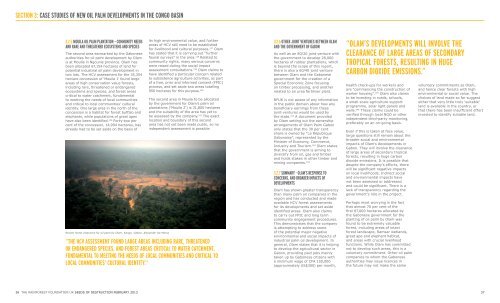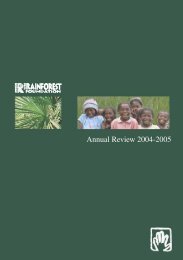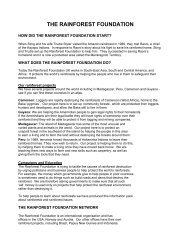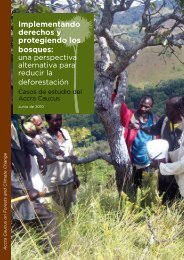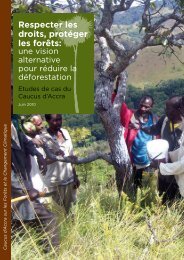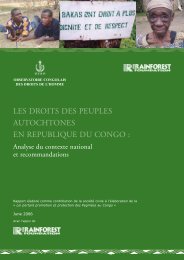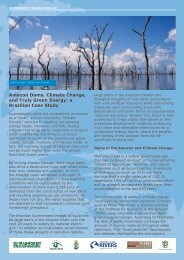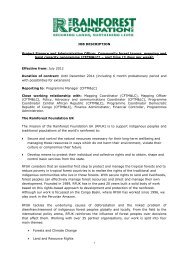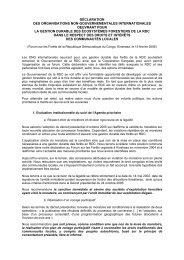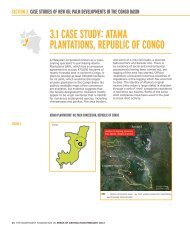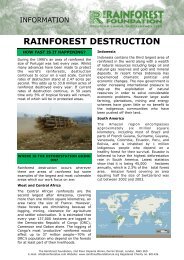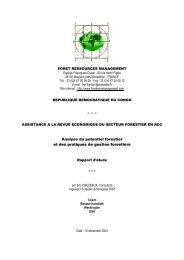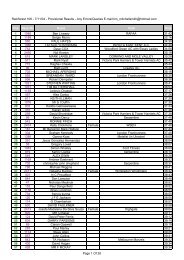Seeds of Destruction - Rainforest Foundation UK
Seeds of Destruction - Rainforest Foundation UK
Seeds of Destruction - Rainforest Foundation UK
Create successful ePaper yourself
Turn your PDF publications into a flip-book with our unique Google optimized e-Paper software.
SECTION 3: CASE STUDIES OF NEW OIL PALM DEVELOPMENTS IN THE CONGO BASIN<br />
3.2.5 MOUILA OIL PALM PLANTATION – COMMUNITY NEEDS<br />
AND RARE AND THREATENED ECOSYSTEMS AND SPECIES<br />
The second area earmarked by the Gabonese<br />
authorities for oil palm development by Olam<br />
is at Mouila in Ngounie province. Olam has<br />
been allocated 67,154 hectares <strong>of</strong> land for<br />
potential industrial oil palm development in<br />
two lots. The HCV assessment for the 35,354<br />
hectare concession <strong>of</strong> ‘Mouila 1’ found large<br />
areas <strong>of</strong> high conservation value forests,<br />
including rare, threatened or endangered<br />
ecosystems and species, and forest areas<br />
critical to water catchment, fundamental<br />
to meeting the needs <strong>of</strong> local communities<br />
and critical to local communities’ cultural<br />
identity. One large area in the north <strong>of</strong> the<br />
concession is a habitat for forest buffalo and<br />
elephants, while populations <strong>of</strong> great apes<br />
have also been identified. 136 Forty-two per<br />
cent <strong>of</strong> the concession, 14,994 hectares, has<br />
already had to be set aside on the basis <strong>of</strong><br />
Recent forest clearance for oil palm by Olam, Kango, Gabon. Alexander De Marcq<br />
its high environmental value, and further<br />
areas <strong>of</strong> HCV still need to be established<br />
for livelihood and cultural purposes. 137 Olam<br />
has stated that it is carrying out “further<br />
faunal surveys” in the area. 138 Related to<br />
community rights, many serious concerns<br />
were raised during the social impact<br />
assessment consultations. 139 Olam claims to<br />
have identified a particular concern related<br />
to subsistence agriculture activities, as part<br />
<strong>of</strong> a free, prior and informed consent (FPIC)<br />
process, and set aside two areas totalling<br />
950 hectares for this purpose. 140<br />
The second area in Mouila to be allocated<br />
by the government for Olam’s palm oil<br />
plantations (‘Mouila 2’) is 31,800 hectares<br />
and the suitability <strong>of</strong> the area has yet to<br />
be assessed by the company. 141 The exact<br />
location and boundary <strong>of</strong> this second<br />
area has not yet been made public, so no<br />
independent assessment is possible.<br />
“THE HCV ASSESSMENT FOUND LARGE AREAS INCLUDING RARE, THREATENED<br />
OR ENDANGERED SPECIES, AND FOREST AREAS CRITICAL TO WATER CATCHMENT,<br />
FUNDAMENTAL TO MEETING THE NEEDS OF LOCAL COMMUNITIES AND CRITICAL TO<br />
LOCAL COMMUNITIES’ CULTURAL IDENTITY.”<br />
3.2.6 OTHER JOINT VENTURES BETWEEN OLAM<br />
AND THE GOVERNMENT OF GABON<br />
As well as an 80/20 joint venture with<br />
the government to develop 28,000<br />
hectares <strong>of</strong> rubber plantations, which<br />
is beyond the scope <strong>of</strong> this report,<br />
there is also a 60/40 joint venture<br />
between Olam and the Gabonese<br />
government for the creation <strong>of</strong> a<br />
Special Economic Zone focusing<br />
on timber processing, and another<br />
related to an urea fertiliser plant.<br />
RF<strong>UK</strong> is not aware <strong>of</strong> any information<br />
in the public domain about how any<br />
beneficiary earnings from these<br />
joint-ventures would be used by<br />
the state. 142 A document provided<br />
by Olam setting out the ownership<br />
arrangements <strong>of</strong> Olam Palm Gabon<br />
only states that the 30 per cent<br />
share is owned by “La République<br />
Gabonaise”, represented by the<br />
Minister <strong>of</strong> Economy, Commerce,<br />
Industry and Tourism. 143 Olam states<br />
that the government is aiming to<br />
diversify from oil, gas and timber<br />
and holds stakes in other timber and<br />
mining companies. 144<br />
3.2.7 SUMMARY - OLAM’S RESPONSE TO<br />
CONCERNS, AND BROADER IMPACTS OF<br />
DEVELOPMENTS<br />
Olam has shown greater transparency<br />
than many palm oil companies in the<br />
region and has conducted and made<br />
available HCV forest assessments<br />
for its developments and set aside<br />
identified areas. Olam also claims<br />
to carry out FPIC and long term<br />
community engagement procedures.<br />
This demonstrates that the company<br />
is attempting to address some<br />
<strong>of</strong> the potential major negative<br />
environmental and social impacts <strong>of</strong><br />
industrial palm oil development. In<br />
general, Olam states that it is helping<br />
to develop the agricultural sector in<br />
Gabon, providing paid jobs mainly<br />
taken up by Gabonese citizens with<br />
a minimum wage <strong>of</strong> CFA 150,000<br />
(approximately US$300) per month,<br />
“OLAM’S DEVELOPMENTS WILL INVOLVE THE<br />
CLEARANCE OF LARGE AREAS OF SECONDARY<br />
TROPICAL FORESTS, RESULTING IN HUGE<br />
CARBON DIOXIDE EMISSIONS.”<br />
health check-ups for workers and<br />
are “commencing the construction <strong>of</strong><br />
worker housing”. 145 Olam also claims<br />
to be investing in roads, schools,<br />
a small-scale agriculture support<br />
programme, solar light panels and<br />
wells. 146 These claims could be<br />
verified through local NGO or other<br />
independent third-party monitoring,<br />
preferably on an on-going basis.<br />
Even if this is taken at face value,<br />
large questions still remain about the<br />
broader social and environmental<br />
impacts <strong>of</strong> Olam’s developments in<br />
Gabon. They will involve the clearance<br />
<strong>of</strong> large areas <strong>of</strong> secondary tropical<br />
forests, resulting in huge carbon<br />
dioxide emissions. It is possible that<br />
despite the company’s efforts, there<br />
will be significant negative impacts<br />
on local livelihoods. Indirect social<br />
and environmental impacts have<br />
not been assessed or addressed<br />
and could be significant. There is a<br />
lack <strong>of</strong> transparency regarding the<br />
government’s role in the project.<br />
Perhaps most worrying is the fact<br />
that almost 70 per cent <strong>of</strong> the<br />
first 87,000 hectares allocated by<br />
the Gabonese government for the<br />
planting <strong>of</strong> oil palm by Olam was<br />
found to be extremely valuable<br />
forest, including areas <strong>of</strong> intact<br />
forest landscape, Ramsar wetlands,<br />
great ape and elephant habitat,<br />
and areas with crucial livelihood<br />
functions. While Olam has committed<br />
not to develop such areas, this is a<br />
voluntary commitment. Other oil palm<br />
companies to whom the Gabonese<br />
authorities may issue licences in<br />
the future may not make the same<br />
voluntary commitments as Olam,<br />
and hence clear forests with high<br />
environmental or social value. The<br />
choices <strong>of</strong> land made so far suggest<br />
either that very little truly ‘suitable’<br />
land is available in the country, or<br />
that there has been insufficient effort<br />
invested to identify suitable land.<br />
36 THE RAINFOREST FOUNDATION <strong>UK</strong> SEEDS OF DESTRUCTION FEBRUARY 2013 37


